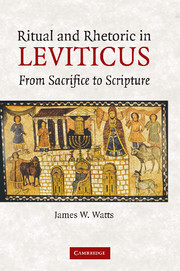Book contents
- Frontmatter
- Contents
- Abbreviations
- Preface
- Ritual and rhetoric in Leviticus
- 1 Introduction: Ritual Text and Ritual Interpretation
- 2 The Rhetoric of Ritual Instruction
- 3 The Rhetoric of Burnt Offerings
- 4 The Rhetoric of Sin, Guilt, and Ritual Offerings
- 5 The Rhetoric of Ritual Narrative
- 6 The Rhetoric of Atonement
- 7 The Rhetoric of Priesthood
- 8 The Rhetoric of Sacrifice
- 9 The Rhetoric of Scripture
- Bibliography
- Index of Biblical Citations
- Index of Other Ancient Literature
- Index of Authors
- Index of Subjects
3 - The Rhetoric of Burnt Offerings
Published online by Cambridge University Press: 22 July 2009
- Frontmatter
- Contents
- Abbreviations
- Preface
- Ritual and rhetoric in Leviticus
- 1 Introduction: Ritual Text and Ritual Interpretation
- 2 The Rhetoric of Ritual Instruction
- 3 The Rhetoric of Burnt Offerings
- 4 The Rhetoric of Sin, Guilt, and Ritual Offerings
- 5 The Rhetoric of Ritual Narrative
- 6 The Rhetoric of Atonement
- 7 The Rhetoric of Priesthood
- 8 The Rhetoric of Sacrifice
- 9 The Rhetoric of Scripture
- Bibliography
- Index of Biblical Citations
- Index of Other Ancient Literature
- Index of Authors
- Index of Subjects
Summary
The ʿōlāh, “burnt offering,” is the paradigmatic offering in the Hebrew Bible. Of all the many technical terms from Israel's cultic worship, the ʿōlāh is most frequently mentioned, and, when multiple offerings are listed, it is almost always listed first. The ʿōlāh's prominence cannot be credited to its actual dominance in ritual: the šĕlāmîm, “peace or communion offerings,” that were eaten by worshippers and priests must have outnumbered the offerings burnt whole on the altar. The offerings would otherwise have impoverished both priests and lay people. That expectation is confirmed by passages that list the numbers of both kinds of offerings: ʿōlôt account for only one out of six animals offered by the elders of Israel according to Numbers 7, and slightly more than one out of ten at Hezekiah's temple rededication according to 2 Chronicles 29. Nevertheless, except when reveling in the sheer number of offerings, the stories and ritual instructions of the Bible grant the ʿōlāh pride of place.
The ʿōlāh's priority in biblical rhetoric requires examination if we are to understand the motives of the writers and the effects these texts had upon early readers and hearers. That is especially true of the most systematic description of Israel's offerings in the Bible, the instructions of Leviticus 1–7. I have argued in Chapter 2 that this material contains various indications that it was shaped to persuade readers/hearers not only to follow its prescriptions but also to accept its authority as torah.
- Type
- Chapter
- Information
- Ritual and Rhetoric in LeviticusFrom Sacrifice to Scripture, pp. 63 - 78Publisher: Cambridge University PressPrint publication year: 2007



